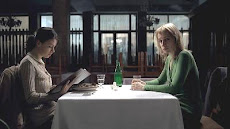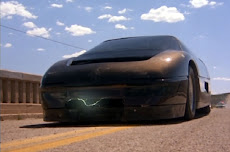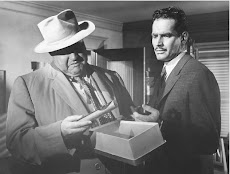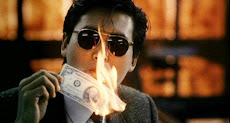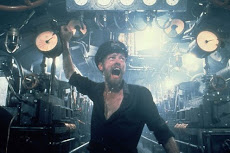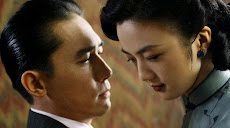Pardon my juvenile expression, but remakes tend to be giant turd-fests. I've said it before, but it's worth repeating. Recently, while channel surfing, I came across City of Angels. I last saw this when it was still a relatively new film, and long before viewing Wings of Desire (Der Himmel uber Berlin), on which the film is based. Although I did not view City of Angels in its entirety this time around, I'm left with the same conclusion: not bad.
Believe it or not, this is more disturbing to me than a turd-fest! It's an uneasiness, a queasiness... what if they're not as easy to distinguish as "artistic mastperiece" Rollerball (1975) from "why-does-Chris-Klein-secure-roles-thought-there-already-is-a-Keanu-Reeves" Rollerball (2002)? Wings of Desire is far superior to City of Angels, but I cannot not slam the latter in its entirety. It adds enough creative elements of its own to pass muster.
I set out to write a short intro, and next thing I know I'm thinking a post about the distressing New Age spiritual void portrayed by City of Angels is in order. Maybe someday. Today, rather, I start a series of posts on remakes that are not turd-fests, nor merely achieve "not bad." Rather, these remakes are nearly as good as, as good as, or, shockingly, even better, than the originals. I will balance my intense criticism of remakes in general by giving comeuppance to those few gems that pull it off. I don't know how long this series will last or the timing of future installments, but I assure you this will be a series. Ahem. I assure you that at the present time I think this will be a series. Fair enough?
Manhunter (1986)
About the time Miami Vice reached the peak of its popularity, its executive producer Michael Mann returned to the director's chair. He'd already established himself, not merely with Vice but with one of the most underrated films in the crime genre, Thief, a few years previously. Almost a decade later, he'd direct Heat, which is, thankfully, given a place on any respectable top-10 crime films list (on this critic's list it's just below Godfather II and Miller's Crossing). I note these films because, while Heat is treasured and Thief is overlooked, Manhunter is a buried treasure. Why? As near as I can tell, it's for the simple fact that it's a prequel to Silence of the Lambs and features the Hannibal Lecter character, but not Anthony Hopkins.
The "error" was, perhaps, so egregious that the novel Red Dragon was re-adapted in 2002, this time with Hopkins in the role. But I'm getting ahead of myself.
If a Manhunter is a sum of two parts, those two parts are Michael Mann's direction and William Petersen's acting. Mann has perhaps one of the best sets of eyes in Hollywood: even his recent mediocrities like Collateral and the Miami Vice movie were visually perfect (and arguably more fun watched on mute). William Petersen is quickly recognized as Gil Grissom from "CSI", but before striking it big his career was shockingly spotty. Outside of To Live and Die in LA, Manhunter, and the first American production of the play "Glengarry Glen Ross", he was seldom challenged and seldom shined. But when he shines, watch out.
The visuals in Manhunter speak for themselves. Not one shot is wasted. I'd share some samples, but screen capture has become ridiculously difficult these days, and I'm too poor to buy some software. Anyway, see it.
With that, let's begin the William Petersen tribute. Petersen's Will Graham is quite obviously messed up from the beginning of the film. What's his deal? Beautiful wife, son, and a gorgeous house on the beach, yet he's a shell of a man. It takes a special kind of skill, luck or combination to radiate this on screen. Graham is a retired FBI agent who, we learn, captured the notorious serial killer Hannibal Lecter. Now his expertise is needed again to capture a murderer known as The Tooth Fairy.
Graham's investigative methods are fascinating, but creepy. He wanders a crime scene, immersing himself in the killer's perspective, eerily coaxing out the Tooth Fairy's methods and, soon enough, finding cracks that could lead to his identity. By now the audience should figure out what kind of effects this kind of work can have on a man, but we're also sure there's something more. Needed guidance, Graham visits the killer he's already captured, Dr. Lecter, and by now we know the capture of Lecter was not exactly a Frank Columbo-style "gotcha!"
Brian Cox also deserves a deal of credit for his performance as Dr. Lecter. To be sure, Anthony Hopkins is rightfully celebrated for his performance in Silence of the Lambs and Red Dragon (I'll viscerate Hannibal in a later tangent), but Cox... whisper it... performs the role with equal skill. Put these to men on opposite sides of the bars and...
Graham's investigation continues, and he teeters. He's afraid to commit because he has not recovered from taking down Lecter. This error endangers his family, and soon enough he's back in Florida hiding them in a safehouse. It's here where we finally get the full story as to exactly what happened to Will Graham when he took Lecter down. We're treated to this as a chat--almost a confrontation--between father and son, once Graham learns his son is afraid of him.This a clever plot device, and it fills in the gaps for the curious, but it also makes it abundantly clear that Graham has a gift, one that we wouldn't wish on anyone. This is not his job, or even his career; it's a calling. Graham is duty-bound to his family as a father, but bound to all the other families out there to stop the Tooth Fairy before he kills again.
The film builds up to a break. I'm happy to say that, despite my spoiler warning, I think I've kept this pretty particular without ruining anything, so the ending is perhaps best left alone. Suffice it to say, Manhunter's qualities abound, and considering many of these were perhaps driven by its less-than-stellar budget, I like it all the more.
Red Dragon (2002)
Hannibal (2001) was stupid. Stupid, stupid, stupid. A mess. And this is coming from a Ridley Scott fan, mind you. In short: the Lecter character transcended reality and became as believable as film slasher Michael Myers. The ending featured a series of gross-outs that played right only to the 16-year-olds who snuck into the film. There is no reason to discuss it, much less see it.
Fortunately, the box office for the film brought forth the remade prequel Red Dragon.
Red Dragon had to be distinct from Manhunter: though the latter is a cult film, the producers knew they had to distinguish it. And they had a bigger budget to play with, too. In doing so, they produced a film that stands on its own two feet and, more importantly, makes for a really fun comparison and contrasting. Nevertheless, with its added frills comes some failures.
To begin, Red Dragon does away with the Special Agent Graham / Lecter mystery by showing how Graham took Lecter down at the start of the film. This is a powerful opening, and it's perhaps Hopkins-Lecter at his most terrifying in any of the films. This makes for an easier transition to Graham living on the beach-- honestly, who can blame him?
It is with this opening scene and various others that Red Dragon shines, but the fascination for fans of the original wanes with what's largely unchanged. Although we see Graham meet Lecter immediately in Red Dragon, their encounter once Graham is on the Tooth Fairy's trail is stale. Norton attempts to add emphasis to Graham's lines that Petersen was wise to de-emphasize, and to little effect.
What's most unfortunate about Norton-Graham is that, while given the same lines as Petersen-Graham from Lecter about the traits he shares with serial killers, it's a hard sell. In fact, it's an impossible sell as Red Dragon continues. Lecter is not a minor character in Red Dragon, and where Graham in Manhunter sought out Lecter to "get the scent" back, Norton-Graham returns again, and again, and again. By the time the film reaches its first major climax Norton-Graham is not following the evidence, but simply what Lecter says about the evidence. Norton-Graham is really just along for the ride.
Red Dragon's different approach to The Tooth Fairy, or Francis Dollarhyde, is far more successful. While in Manhunter we're introduced to the Tooth Fairy, ably portrayed by Tom Noonan, the sympathy we feel for the character is minimal. He's disturbed, to be sure, but we're not treated to a serious sense of struggle or, for that matter, to the extent of his insanity. Red Dragon takes the opposite approach: Ralph Fiennes gives us evil, but also conflict and a better look at the twisted fantasy behind his vile acts. Much is owed to Emily Watson, whose Reba McCLane almost unwittingly ends the Tooth Fairy's terror when she falls in love with him. It's a great approach: there are, indeed, those who commit crimes purely from insanity, but Red Dragon is not quite so heavy-handed as to excuse Dollarhyde. We may not sympathize, but we lament his choices.
My final note about Red Dragon is acknowledging its disadvantage: while Manhunter succeeded with a lack of budget, Red Dragon largely succeeded with a lack of direction. To his credit, Brett Ratner gets around as a director, producer, and occasional actor (as of this writing, he has 12 projects listed as "in development" on IMDB). Nevertheless, his track record as a director is dismal outside of Red Dragon. The Rush Hour films are all largely forgettable, and I've long considered The Family Man one of the closest things to cinematic Armageddon. (It is perhaps the total dishonesty of this film that makes City of Angels seem so not-bad.) Certain films with Edward Norton, such as American History X, were allegedly directed-in-fact by Norton himself, and I imagine Norton's influence was pervasive here, too.
All things considered, my preference for Manhunter comes from Graham's resolve. While Edward Norton's Graham ends up feeling sorry for the Tooth Fairy (far more than the audience, I believe), Petersen's is far less forgiving:
Believe it or not, this is more disturbing to me than a turd-fest! It's an uneasiness, a queasiness... what if they're not as easy to distinguish as "artistic mastperiece" Rollerball (1975) from "why-does-Chris-Klein-secure-roles-thought-there-already-is-a-Keanu-Reeves" Rollerball (2002)? Wings of Desire is far superior to City of Angels, but I cannot not slam the latter in its entirety. It adds enough creative elements of its own to pass muster.
I set out to write a short intro, and next thing I know I'm thinking a post about the distressing New Age spiritual void portrayed by City of Angels is in order. Maybe someday. Today, rather, I start a series of posts on remakes that are not turd-fests, nor merely achieve "not bad." Rather, these remakes are nearly as good as, as good as, or, shockingly, even better, than the originals. I will balance my intense criticism of remakes in general by giving comeuppance to those few gems that pull it off. I don't know how long this series will last or the timing of future installments, but I assure you this will be a series. Ahem. I assure you that at the present time I think this will be a series. Fair enough?
Spoiler Warning: You can't do this right without 'em. Deal.
Manhunter (1986)

About the time Miami Vice reached the peak of its popularity, its executive producer Michael Mann returned to the director's chair. He'd already established himself, not merely with Vice but with one of the most underrated films in the crime genre, Thief, a few years previously. Almost a decade later, he'd direct Heat, which is, thankfully, given a place on any respectable top-10 crime films list (on this critic's list it's just below Godfather II and Miller's Crossing). I note these films because, while Heat is treasured and Thief is overlooked, Manhunter is a buried treasure. Why? As near as I can tell, it's for the simple fact that it's a prequel to Silence of the Lambs and features the Hannibal Lecter character, but not Anthony Hopkins.
The "error" was, perhaps, so egregious that the novel Red Dragon was re-adapted in 2002, this time with Hopkins in the role. But I'm getting ahead of myself.
If a Manhunter is a sum of two parts, those two parts are Michael Mann's direction and William Petersen's acting. Mann has perhaps one of the best sets of eyes in Hollywood: even his recent mediocrities like Collateral and the Miami Vice movie were visually perfect (and arguably more fun watched on mute). William Petersen is quickly recognized as Gil Grissom from "CSI", but before striking it big his career was shockingly spotty. Outside of To Live and Die in LA, Manhunter, and the first American production of the play "Glengarry Glen Ross", he was seldom challenged and seldom shined. But when he shines, watch out.
The visuals in Manhunter speak for themselves. Not one shot is wasted. I'd share some samples, but screen capture has become ridiculously difficult these days, and I'm too poor to buy some software. Anyway, see it.
With that, let's begin the William Petersen tribute. Petersen's Will Graham is quite obviously messed up from the beginning of the film. What's his deal? Beautiful wife, son, and a gorgeous house on the beach, yet he's a shell of a man. It takes a special kind of skill, luck or combination to radiate this on screen. Graham is a retired FBI agent who, we learn, captured the notorious serial killer Hannibal Lecter. Now his expertise is needed again to capture a murderer known as The Tooth Fairy.
Graham's investigative methods are fascinating, but creepy. He wanders a crime scene, immersing himself in the killer's perspective, eerily coaxing out the Tooth Fairy's methods and, soon enough, finding cracks that could lead to his identity. By now the audience should figure out what kind of effects this kind of work can have on a man, but we're also sure there's something more. Needed guidance, Graham visits the killer he's already captured, Dr. Lecter, and by now we know the capture of Lecter was not exactly a Frank Columbo-style "gotcha!"
Brian Cox also deserves a deal of credit for his performance as Dr. Lecter. To be sure, Anthony Hopkins is rightfully celebrated for his performance in Silence of the Lambs and Red Dragon (I'll viscerate Hannibal in a later tangent), but Cox... whisper it... performs the role with equal skill. Put these to men on opposite sides of the bars and...
I know that I'm not smarter than you.You could cut the tension with a knife. It's a confrontation that trumps any by Jodie Foster (Silence of the Lambs), Julianne Moore (Hannibal) and, as we'll discuss later, Ed Norton.
Then how did you catch me?
You had disadvantages.
What disadvantages?
You're insane.
Graham's investigation continues, and he teeters. He's afraid to commit because he has not recovered from taking down Lecter. This error endangers his family, and soon enough he's back in Florida hiding them in a safehouse. It's here where we finally get the full story as to exactly what happened to Will Graham when he took Lecter down. We're treated to this as a chat--almost a confrontation--between father and son, once Graham learns his son is afraid of him.
What happened?
Well, Lecter was attacking college girls, and he killed them.
How?
In bad ways.
The film builds up to a break. I'm happy to say that, despite my spoiler warning, I think I've kept this pretty particular without ruining anything, so the ending is perhaps best left alone. Suffice it to say, Manhunter's qualities abound, and considering many of these were perhaps driven by its less-than-stellar budget, I like it all the more.
Red Dragon (2002)
Hannibal (2001) was stupid. Stupid, stupid, stupid. A mess. And this is coming from a Ridley Scott fan, mind you. In short: the Lecter character transcended reality and became as believable as film slasher Michael Myers. The ending featured a series of gross-outs that played right only to the 16-year-olds who snuck into the film. There is no reason to discuss it, much less see it.
Fortunately, the box office for the film brought forth the remade prequel Red Dragon.
Red Dragon had to be distinct from Manhunter: though the latter is a cult film, the producers knew they had to distinguish it. And they had a bigger budget to play with, too. In doing so, they produced a film that stands on its own two feet and, more importantly, makes for a really fun comparison and contrasting. Nevertheless, with its added frills comes some failures.
To begin, Red Dragon does away with the Special Agent Graham / Lecter mystery by showing how Graham took Lecter down at the start of the film. This is a powerful opening, and it's perhaps Hopkins-Lecter at his most terrifying in any of the films. This makes for an easier transition to Graham living on the beach-- honestly, who can blame him?
It is with this opening scene and various others that Red Dragon shines, but the fascination for fans of the original wanes with what's largely unchanged. Although we see Graham meet Lecter immediately in Red Dragon, their encounter once Graham is on the Tooth Fairy's trail is stale. Norton attempts to add emphasis to Graham's lines that Petersen was wise to de-emphasize, and to little effect.
What's most unfortunate about Norton-Graham is that, while given the same lines as Petersen-Graham from Lecter about the traits he shares with serial killers, it's a hard sell. In fact, it's an impossible sell as Red Dragon continues. Lecter is not a minor character in Red Dragon, and where Graham in Manhunter sought out Lecter to "get the scent" back, Norton-Graham returns again, and again, and again. By the time the film reaches its first major climax Norton-Graham is not following the evidence, but simply what Lecter says about the evidence. Norton-Graham is really just along for the ride.
Red Dragon's different approach to The Tooth Fairy, or Francis Dollarhyde, is far more successful. While in Manhunter we're introduced to the Tooth Fairy, ably portrayed by Tom Noonan, the sympathy we feel for the character is minimal. He's disturbed, to be sure, but we're not treated to a serious sense of struggle or, for that matter, to the extent of his insanity. Red Dragon takes the opposite approach: Ralph Fiennes gives us evil, but also conflict and a better look at the twisted fantasy behind his vile acts. Much is owed to Emily Watson, whose Reba McCLane almost unwittingly ends the Tooth Fairy's terror when she falls in love with him. It's a great approach: there are, indeed, those who commit crimes purely from insanity, but Red Dragon is not quite so heavy-handed as to excuse Dollarhyde. We may not sympathize, but we lament his choices.
My final note about Red Dragon is acknowledging its disadvantage: while Manhunter succeeded with a lack of budget, Red Dragon largely succeeded with a lack of direction. To his credit, Brett Ratner gets around as a director, producer, and occasional actor (as of this writing, he has 12 projects listed as "in development" on IMDB). Nevertheless, his track record as a director is dismal outside of Red Dragon. The Rush Hour films are all largely forgettable, and I've long considered The Family Man one of the closest things to cinematic Armageddon. (It is perhaps the total dishonesty of this film that makes City of Angels seem so not-bad.) Certain films with Edward Norton, such as American History X, were allegedly directed-in-fact by Norton himself, and I imagine Norton's influence was pervasive here, too.
All things considered, my preference for Manhunter comes from Graham's resolve. While Edward Norton's Graham ends up feeling sorry for the Tooth Fairy (far more than the audience, I believe), Petersen's is far less forgiving:
As a child, my heart bleeds for him. Someone took a little boy and turned him into a monster. But as an adult... as an adult, he's irredeemable. He butchers whole families to fulfill some sick fantasy. As an adult, I think someone should blow the sick fuck out of his socks.May we all learn something from such an unequivocal limit on sympathy.


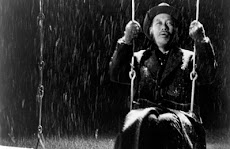

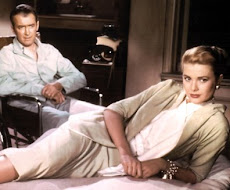_01.jpg)
